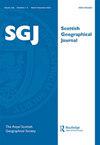2019冠状病毒病对苏格兰农业社区数字化和社会资本的影响
IF 2
4区 社会学
Q2 GEOGRAPHY
引用次数: 0
摘要
摘要在2019冠状病毒病大流行期间,对农村社区来说,数字化和通信技术的普及从未像现在这样重要。从农村的角度来看,数字化具有鲜明的特征,可靠和可获取的数字工具和基础设施对农村社区的未来具有显著影响。这在COVID-19封锁期间尤为重要,当时在农村(以及城市)社区,人们推动在网上举办当地活动和服务。本文通过对苏格兰西北高地一个佃农社区进行的面对面和在线研究的反思,反思了数字工具的使用如何支持不同类型社会资本的发展。成功的农村数字化有可能以多种方式使农村耕作社区受益:例如,通过支持农村人口再安置工作,使人们能够进入新的数字市场销售农产品,并通过在线会议支持积极参与地方决策。在具有特定数字化需求和挑战的农村地区,实现数字利益仍然存在一些障碍。本文反思了实证研究结果,并考虑了后covid数字时代农村耕作社区的未来可持续性。关键词:COVID-19种植社区数字化苏格兰农村社会资本致谢我们要感谢所有参与我们研究活动的参与者,特别感谢西北高地社区在COVID-19期间的热情好客和愿意参与我们的研究。感谢当前苏格兰政府的战略研究计划2022-2027和项目JHI-E2-2:农村社区,这使得主要作者能够重新审视社区并撰写本文中提出的研究结果。披露声明作者未报告潜在的利益冲突。注1该命令于2020年3月23日在苏格兰首席部长尼古拉·斯特金(Nicola Sturgeon)的电视讲话中生效https://spice-spotlight.scot/2022/12/16/timeline-of-coronavirus-COVID-19-19-in-scotland/.2“农村地区的经济和社会影响”是由比萨大学协调的地平线2020项目(2019-2023),涉及25个合作伙伴组织(研究机构,非政府组织和中小企业),是一个多参与者和跨学科联盟。3 DESIRA使用术语“生活实验室”来表示每个案例研究,以突出我们研究活动的互动性和参与性。为了方便起见,研究人员对我们的研究参与者使用了“案例研究”一词高地社区宽带(HCB)已于2017年开始向更广泛的社区提供高速宽带,但对于许多接受采访的居民来说,直到2020年大流行前的早期才开始安装,在某些情况下甚至还在进行中。更多信息请访问https://hcbroadband.co.uk/。5 . https://www.womeninagriculture.scot/.6数字提升:https://www.bgateway.com/resources/digitalboost通过商业网关(通过地方当局交付)。这是一项苏格兰范围内的倡议,通过地方当局提供,为企业提供免费的数字健康检查,访问网络研讨会和培训材料,以及长达21小时的顾问免费咨询这项年度申请可以在线完成,也可以到当地办事处使用其专用计算机进行操作。虽然办公室的工作人员可以提供一些帮助,但他们不能对个人申请负责。更多信息请参见https://www.ruralpayments.org/topics/apply-for-funding/single-application-form/。根据第818194号拨款协议,desira已获得欧盟地平线2020研究与创新计划的资助。苏格兰政府2022-2027年战略研究计划和JHI-E2-2项目:农村社区。本文章由计算机程序翻译,如有差异,请以英文原文为准。
The impacts of COVID-19 on digitalisation and social capital in crofting communities in Scotland
ABSTRACTIncreasing digitalisation and access to communication technologies has arguably never been more important to rural communities than during the COVID-19 pandemic. Digitalisation assumes a distinct character when looked at through a rural lens, reliable and accessible digital tools and infrastructure having marked implications for the future of rural communities. This was especially pertinent during COVID-19 lockdowns, when in rural (as well as urban) communities there was a push to host local activities and services online. Using reflections from both in-person and online research engagements with a crofting community in the North West Highlands of Scotland, this paper reflects on how the use of digital tools can support the development of different types of social capital. Successful rural digitalisation has the potential to benefit rural crofting communities in multiple ways: e.g. by supporting rural repopulation efforts, enabling access to new digital markets to sell produce, and supporting active participation in local decision-making through online meetings. Several barriers to realising digital benefits still exist in rural regions with specific digitalisation needs and challenges. The paper reflects on empirical findings and considers the future sustainability of rural crofting communities in the post-COVID, digital age.KEYWORDS: COVID-19crofting communitydigitalisationrural Scotlandsocial sapital AcknowledgmentsWe would like to thank all of the participants who took part in our research engagements with specific thanks to the community in North West Highlands for their hospitality and willingness to take part in our research during COVID-19. Thanks are extended to the current Scottish Government’s Strategic Research Programme 2022–2027 and project JHI-E2-2: Rural Communities, which has allowed the lead author to revisit the community and write up the findings presented in this paper.Disclosure statementNo potential conflict of interest was reported by the author(s).Notes1 This order was effective from 23 March 2020 in a televised address from Nicola Sturgeon, First Minister for Scotland https://spice-spotlight.scot/2022/12/16/timeline-of-coronavirus-COVID-19-19-in-scotland/.2 DESIRA (Digitisation: Economic and Social Impacts in Rural Areas) is a Horizon 2020 project (2019–2023) coordinated by the University of Pisa which involves 25 partner organisations (research institutes, NGOs and SMEs) in a multi-actor and inter-disciplinary Consortium.3 DESIRA used the terminology ‘Living Labs’ to denote each case study in order to highlight the interactive and participatory nature of our research engagements. The researchers used the term ‘case study’ with our research participants for ease.4 Highland Community Broadband (HCB) had begun the process of bringing high-speed broadband to the wider community in 2017, yet for many residents interviewed, the installation did not happen until early pre-pandemic 2020 and was even ongoing in some cases. Visit https://hcbroadband.co.uk/ for more information.5 https://www.womeninagriculture.scot/.6 Digital Boost: https://www.bgateway.com/resources/digitalboost via Business Gateway (delivered through local authorities). This is a Scotland-wide initiative delivered via local authorities which offers businesses a free digital health-check, access to webinars and training materials as well as up to 21 h of free advice with an adviser.7 This annual application can be completed online or by visiting a local area office to use one of their dedicated computers for this operation. Whilst staff at the office are available to offer some assistance, they cannot be held responsible for the individual application. See https://www.ruralpayments.org/topics/apply-for-funding/single-application-form/ for more information.Additional informationFundingDESIRA has received funding from the European Union’s Horizon 2020 Research and Innovation Programme under grant agreement No 818194. Scottish Government’s Strategic Research Programme 2022-2027 and project JHI-E2-2: Rural Communities.
求助全文
通过发布文献求助,成功后即可免费获取论文全文。
去求助
来源期刊

Scottish Geographical Journal
GEOGRAPHY-
CiteScore
1.80
自引率
20.00%
发文量
19
期刊介绍:
The Scottish Geographical Journal is the learned publication of the Royal Scottish Geographical Society and is a continuation of the Scottish Geographical Magazine, first published in 1885. The Journal was relaunched in its present format in 1999. The Journal is international in outlook and publishes scholarly articles of original research from any branch of geography and on any part of the world, while at the same time maintaining a distinctive interest in and concern with issues relating to Scotland. “The Scottish Geographical Journal mixes physical and human geography in a way that no other international journal does. It deploys a long heritage of geography in Scotland to address the most pressing issues of today."
 求助内容:
求助内容: 应助结果提醒方式:
应助结果提醒方式:


